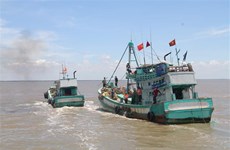US journal highlights Vietnam’s success in mitigating COVID-19 impacts
 Vietnam has basically managed to control the COVID-19 pandemic and resume economic activities (Photo: VNA)
Vietnam has basically managed to control the COVID-19 pandemic and resume economic activities (Photo: VNA)
Hanoi (VNA) – US journal Borgen Magazine has run a story entitled “COVID-19 in Vietnam Declines: A Success Story” by Maggie Sun, highlighting Vietnam’s success in maintaining its safety and economic growth amidst the devastating impacts of the pandemic around the world.
According to the article, the reign of COVID-19 in Vietnam has been watery and short-lived, in contrast to other global countries such as Italy or the United States. The country had a unique approach to testing; mass-testing procedures have allowed Vietnamese doctors to practice thorough contact tracing and thus effectively control the spread of cases.
Combined with strict national lockdown procedures and quarantine orders, Vietnam has seen only a few hundred infections and no deaths from COVID-19.
Vietnam’s success
The article highlighted that despite the tenure of COVID-19 in Vietnam and the world, the Vietnamese government remains optimistic about the country’s economy. The Vietnam Institute for Economic and Policy Research (VEPR) predicts at least 5-percent growth in the country’s GDP by the end of 2020, and citizens have already resumed normal economic activities. In the midst of a global pandemic, the spirit of Vietnam seems unworried about fiscal matters.
This is due to several governmental factors. Over the past few decades, the poverty rate in Vietnam has fallen drastically as services such as healthcare have become more widely available to citizens. In 1990, the country’s extreme poverty rate was 50 percent. Today, that figure has fallen to 2 percent. In 2019, 90 percent of Vietnamese citizens have access to health insurance, compared to 59 percent in 2011.
Economic growth in the midst of the pandemic
The article noted that the governance of Vietnam in the face of COVID-19 reflects measures that the country has taken against poverty. Even as COVID-19 in Vietnam dies down, economic projects are underway as countermeasures against poverty and toward the development of the country. The government’s recently issued Resolution 84 outlines incentives and fee reductions for small, private-owned businesses as they attempt to operate during pandemic times. Under this resolution, there is a 15 percent reduction in the renting price for government-owned land. In addition, the resolution includes a 2-percent interest reduction for government loans to small and medium-sized enterprises. Such fee reductions are potentially conducive to more employment and greater amounts of business.
Additionally, Vietnam and the EU recently came to an agreement on a free trade deal. The deal would eliminate 99 percent of tariffs on traded goods between the sides. Global organisations such as the World Bank looked upon this deal positively. The World Bank estimates that Vietnam’s GDP and exports may be boosted by 12 percent by 2030. These optimistic projections also benefit the citizens of Vietnam - many of whom are farmers or producers of exported goods.
Continued poverty alleviation efforts
According to the author, Vietnam’s economic growth is inexplicably tied to poverty reduction. Beyond economic reform, however, the Vietnamese government has also taken grassroots measures against poverty. Programmes such as the Hunger and Poverty Eradication Programme have been conducted with the collaboration of the United Nations Development Programme (UNDP) to target rural poverty by assisting rural Vietnamese villages with resources such as education and social safety net programmes. In 1998, when they established HEPR, only 75 percent of citizens in the country between ages 15-24 had completed primary education. That figure had increased to 96 percent by 2010.
 Taking samples for COVID-19 testing (Photo: VNA)
Taking samples for COVID-19 testing (Photo: VNA)Foreign aid has also been an important component in Vietnam’s numerous poverty alleviation projects. As of 2020, the World Bank has granted more than 20 billion USD to Vietnam in the form of grants and loans. In addition, several campaigns to reduce poverty have been launched in recent years. The Second Northern Mountains Poverty Reduction Project, for example, aided 192,000 households in raising their incomes by 16 percent from 2010 to 2018.
The author held that Vietnam has made major strides in poverty alleviation and economic growth. However, even though Vietnam has largely dealt with COVID-19, it must continue to fight poverty on all fronts. Though the country has done well so far, it has not yet eradicated poverty. Without COVID-19 in Vietnam as a large issue, perhaps Vietnam may surge forth in the fight against poverty in these coming years, Sun concluded./.













